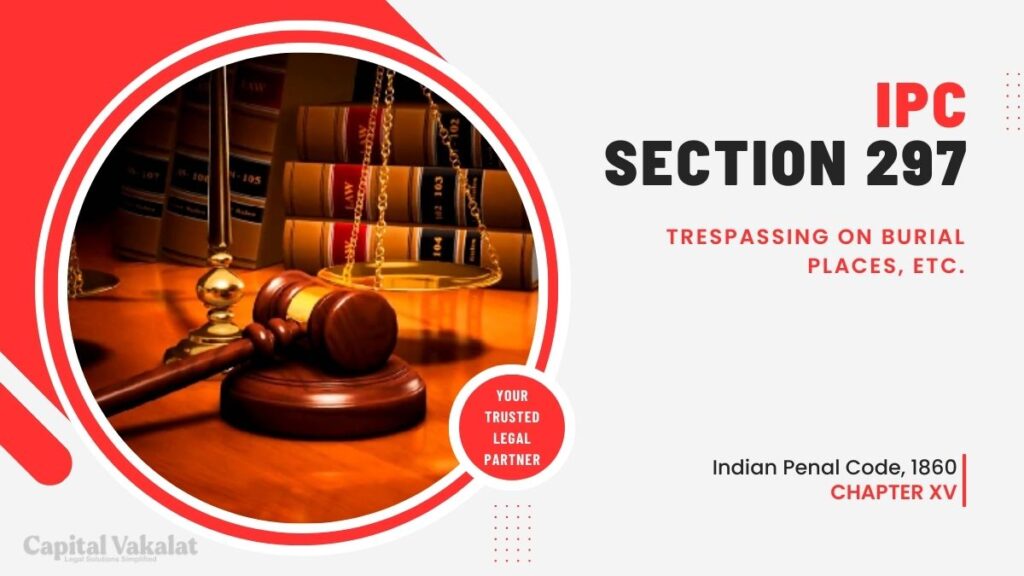In the tapestry of legal frameworks, Section 297 of the Indian Penal Code (IPC) stands as a significant thread, addressing the sensitive issue of trespassing on burial places and related spaces. This provision delves into the complexities surrounding the sanctity of final resting places and the legal repercussions for those who breach this sacred ground.

In this comprehensive exploration, we will dissect the nuances of Section 297 IPC, shedding light on its implications, exceptions, and the broader legal landscape it navigates.
Understanding the Legal Tapestry
Section 297 of the IPC serves as a guardian of the peace and sanctity associated with burial grounds, cremation sites, and places of worship. It explicitly outlines the legal consequences for those who willfully violate these spaces, recognizing the cultural, religious, and emotional significance attached to them.
Decoding Section 297 IPC
The provision begins by stipulating that whoever commits trespass on any burial ground, monument, or place of worship with the intention of insulting the religious feelings of any person, shall be punished with imprisonment for a term that may extend to one year, or with a fine, or both. This seemingly straightforward statement, however, opens the door to a myriad of legal interpretations and considerations.
Unraveling Intent: A Legal Tightrope
One of the key elements of Section 297 IPC is the requirement to prove the intention to insult religious feelings. Courts grapple with unraveling the intricate web of motives behind trespassing incidents, navigating through the subjective nature of intent. This element injects a level of complexity that underscores the need for a nuanced legal approach.
Exceptions and Grey Areas
As with any legal provision, Section 297 IPC has its exceptions and grey areas. Understanding these nuances is crucial for a comprehensive grasp of the legal ramifications. For instance, cases where trespass occurs without the intention to insult religious feelings may warrant a different legal response. Additionally, questions arise concerning the definition of ‘religious feelings,’ making it imperative to explore case law and judicial interpretations for clarity.
Legal Precedents: Shaping the Landscape
The legal landscape surrounding Section 297 IPC is shaped by a multitude of judicial decisions. Landmark cases serve as guiding beacons, illuminating the path for future interpretations and applications of the law. Examining these precedents provides insight into the evolving nature of legal perspectives on trespassing and the protection of burial places.
The Burden of Proof: A Delicate Balancing Act
Navigating the legal intricacies of Section 297 IPC requires a delicate balancing act when it comes to the burden of proof. Establishing intent and demonstrating the insult to religious feelings necessitate a robust evidentiary framework. This aspect of the law highlights the importance of thorough investigation and presentation of evidence in legal proceedings.
Public Outcry and Legal Reforms
Instances of trespassing on burial places often spark public outcry, prompting discussions on the adequacy of existing legal provisions. This article delves into the ongoing dialogue surrounding the need for legal reforms to address emerging challenges and ensure the continued protection of sacred spaces.
Conclusion: Safeguarding Sanctity in a Legal Framework
In conclusion, Section 297 IPC stands as a sentinel guarding the sanctity of burial places and places of worship. Navigating its intricate provisions requires a deep understanding of legal precedents, the burden of proof, and the delicate balance between protecting religious sentiments and individual rights. As the legal landscape evolves, so too must our approach to preserving the sanctity of these sacred grounds.
Frequently Asked Questions
How do courts determine the intention to insult religious feelings in trespassing cases?
Courts evaluate various factors, including the actions of the accused, statements made, and contextual elements to determine intent. Legal precedents play a significant role in shaping these interpretations.
Are there any specific defenses available for individuals charged under Section 297 IPC?
Defenses may vary based on the circumstances, but lack of intent or evidence proving the absence of an insult to religious feelings could be potential defenses. Consultation with a legal expert is recommended for specific cases.
Does Section 297 IPC apply to all burial places and places of worship?
Yes, Section 297 IPC applies broadly to burial grounds, monuments, and places of worship, irrespective of the religious denomination. The focus is on the intention to insult religious feelings rather than the specific religious affiliation of the site.
How can legal reforms address emerging challenges in protecting burial places?
Legal reforms may involve refining the language of Section 297, considering evolving societal norms, and addressing specific challenges posed by modern issues such as technological trespass. Public engagement and expert input are vital in shaping effective legal reforms.